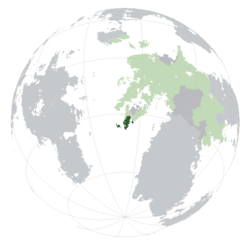Difference between revisions of "Kingdom of Hemesh"
| Line 50: | Line 50: | ||
}} | }} | ||
'''Hemesh''' ([[Hemeshi language|Hemeshi]]: ''Hemes'', IPA: /ˈhemeʂ/), sometimes known as '''West Hemesh''' | '''Hemesh''' ([[Hemeshi language|Hemeshi]]: ''Hemes'', IPA: /ˈhemeʂ/), sometimes known as '''West Hemesh''' and officially the '''United Kingdom of Hemesh''', is a country located in the [[Hemeshi peninsula]] in [[Ekuosia]]. It is bordered to the north by [[Fyevan]] and to the east by [[Sroyos]], and to the south and west by the Armizziya sea; it is separated by [[Orzun]] by the Gulf of Amun. It is the second largest state on the Hemesh peninsula by size and the largest by population. | ||
Human presence on the Hemesh peninsula dates back to the Paleolithic. Indigenous agrarian people largely inhabited the peninsula until they were gradually displaced by Argeyazic pastoralists who migrated south during the mid 1st millenium BCE. City-states and minor kingdoms began to appear around 300BCE, though the peninsula remained disunited until its unification in 620 CE. Iovism arrived during the first century CE, which would became the dominant religion until widespread Pashaification in the 14th century, when Hemesh came under the rule of the First Terminian Empire. | Human presence on the Hemesh peninsula dates back to the Paleolithic. Indigenous agrarian people largely inhabited the peninsula until they were gradually displaced by Argeyazic pastoralists who migrated south during the mid 1st millenium BCE. City-states and minor kingdoms began to appear around 300BCE, though the peninsula remained disunited until its unification in 620 CE. Iovism arrived during the first century CE, which would became the dominant religion until widespread Pashaification in the 14th century, when Hemesh came under the rule of the First Terminian Empire. | ||
The modern-day United Kingdom of Hemesh dates back to 1849, when several small kingdoms on the south coast became protectorates of the Letzian Empire. In 1888 Letzia annexed all of western Hemesh from [[Olboros Terminia]]. Briefly governed as a separate colony, responsibility for the conquered territory was given to the united protectorates in 1899. After the onset of civil war in Letzia, Prince [[Sahad Adoz]] of Gemet took steps to unite the protectorates and formed the [[Kingdom of Hemesh]] in 1929, though the country remain under Letzian suzerainty. | |||
==Etymology== | ==Etymology== | ||
Revision as of 06:12, 15 May 2019
- Not to be confused with the Hemesh Peninsula.
| Kingdom of Hemesh |
||||||
|---|---|---|---|---|---|---|
|
||||||
The Kingdom of Hemesh (dark green) within the Ekuosian Union (light green) and Ekuosia (dark grey)
|
||||||
| Capital and largest city | Gemet | |||||
| Official languages | Standard Hemeshi | |||||
| Recognised regional languages | Ksham | |||||
| Demonym | Hemeshi West Hemeshi |
|||||
| Government | Federal constitutional monarchy[n 1] | |||||
| Area | ||||||
| - | Total | 242,983 km2 93,816 sq mi |
||||
| Population | ||||||
| - | 2015 census | 28,147,100 | ||||
| - | Density | 115.84/km2 300/sq mi |
||||
| Time zone | Western Hemeshi Time (SCT-1) | |||||
| Drives on the | left | |||||
| Internet TLD | .hm | |||||
Hemesh (Hemeshi: Hemes, IPA: /ˈhemeʂ/), sometimes known as West Hemesh and officially the United Kingdom of Hemesh, is a country located in the Hemeshi peninsula in Ekuosia. It is bordered to the north by Fyevan and to the east by Sroyos, and to the south and west by the Armizziya sea; it is separated by Orzun by the Gulf of Amun. It is the second largest state on the Hemesh peninsula by size and the largest by population.
Human presence on the Hemesh peninsula dates back to the Paleolithic. Indigenous agrarian people largely inhabited the peninsula until they were gradually displaced by Argeyazic pastoralists who migrated south during the mid 1st millenium BCE. City-states and minor kingdoms began to appear around 300BCE, though the peninsula remained disunited until its unification in 620 CE. Iovism arrived during the first century CE, which would became the dominant religion until widespread Pashaification in the 14th century, when Hemesh came under the rule of the First Terminian Empire.
The modern-day United Kingdom of Hemesh dates back to 1849, when several small kingdoms on the south coast became protectorates of the Letzian Empire. In 1888 Letzia annexed all of western Hemesh from Olboros Terminia. Briefly governed as a separate colony, responsibility for the conquered territory was given to the united protectorates in 1899. After the onset of civil war in Letzia, Prince Sahad Adoz of Gemet took steps to unite the protectorates and formed the Kingdom of Hemesh in 1929, though the country remain under Letzian suzerainty.
Etymology
History
Geography
Geology
Climate
Biodiversity
Politics
Government
Administrative divisions
Foreign relations
Military
Economy
Transport
Energy
Science and technology
Tourism
Demographics
Ethnic groups
Urbanisation
Language
Education
Healthcare
Religion
Culture
Heritage
Architecture
Literature
Art
Music
Theatre
Film
Cuisine
Sport
Symbols
See also
- ↑ While Hemesh is officially led by a president, it is by custom held by the Prince of Gemet, making it a de facto hereditary position.


